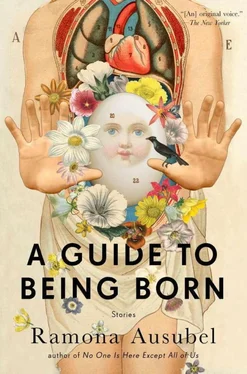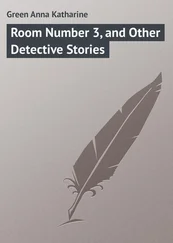“The fighting was mostly over money. It wasn’t about you.”
“Your mother did not mean to hit you in the eye with the serving platter. You just walked into it.”
“Your granddad forgave you for getting lost in Puerto Vallarta that day.”
“And your sister looked beautiful in her blue dress,” a husky voice adds. The grandmothers, Alice among them, see the blue dress. Some see a silk navy A-line, some see a cotton sheath belted at the waist, some see an evening dress flicker out the door and into a waiting car. They are quiet in their rememberings.
“Who is there when I die?” someone asks, and they all nod to say yes, they wonder that too. Alice clears her throat and begins, confident.
“Your children are there,” she tells them. “All of them. Three of your grandchildren too. They all have their hands on your body. You can feel them letting go of warmth. It doesn’t stop at the skin or at the bone—nothing can stop it. They are singing ‘Michael, Row the Boat Ashore.’ Outside the window you can see a lake and a Ferris wheel on the edge. It is not raining outside but it looks like it might.”
The grandmothers have wet eyes. They are all picturing themselves lying there with many pairs of hands covering them, more hands than possible, their bodies hidden. It is just the backs of hands, familiar and radiating and with very faint pulses. In their minds, the grandmothers dissolve under those palms. They go gaseous. It is no longer necessary to maintain any particular shapes.
Alice sits surrounded by the rattle of their collective breathing. These lungs are not noiseless machines anymore. In this close circle they are trading matter; molecules of one go straight into the tubes of another. Alice thinks of the ocean they are floating on, waves rolling out over the miles. And in those waves, fish in schools so large they turn the ocean silver.
“We are out at sea,” she says. “We should not go to bed. We should go fishing.” The faces in the dim firelight are uncertain. “We are floating on top of a lot of creatures. Let’s see what we catch,” she tries to explain.
“We don’t have any poles,” a voice counters.
“We can make some,” Alice responds. “We have no idea what might be down there!” Her voice is high and excited.
No one wants to be left alone, so they pull their blankets tighter, though it isn’t cold. The women set to work unraveling strings from the salt-heavy ropes coiled like great snakes on deck. They isolate one string at a time and then tie them around the necks of some of the baseball bats. The grandmothers disperse along the railing and drop their very long lines. The lines have no hooks and no bait. Those lines on the port side, where the wind is coming from, are pasted to the hull like clinging lizards. Those lines on starboard blow out so that, all together, the row of them looks like the rib cage of a whale.
The women themselves are nearly invisible but for some moonlit glowings of hair—fuzzy little white islands in the dark. The sound of the overhead ring of gulls is mostly wing noise and an occasional vocal cry.
In the underneath, in that syrupy dark, the creatures they are trying to catch do not notice the tips of the hopeful strings. Jellies jet themselves along, not going anywhere, just moving for the sake of moving. Any fishes who can glow, glow. Some have patterns of light on their spines. Fake eyes look like real eyes for the purpose of being left alone. Sharks separate the water like curtains, currents flowing off their bared teeth.
There is always the chance of a giant squid and the great likelihood of regular squid. The octopus must not need, in the dark hours, to dispense their ink. The ink stays churning inside the cool gut of the creature, all eight arms reaching and twisting and gathering. Miniature fish congregate and suck at the bodies of bigger fish, eating the growing algae. Turtles swim the length of entire oceans in order to lay their eggs on the beach where they were born.
The ship sloshes and the grandmothers sway. They keep their lines steady, most balancing the tiny baseball bats on their laps. They hum. Their voices are crackly and uneven. Some go for television theme songs. Some fumble over old lullabies. They don’t mind that their melodies do not match up—it is nice to hear the humming and to do the humming, just to make noise. To feel the throat vibrating and air in the nose.
Alice is humming a lullaby invented by her own grandmother about a small horse when she feels a tug at her line. The song dies in her chest. She is holding on with both her hands, each one bearing a wedding ring—husband number one on her right and husband number two on her left. Her knuckles are pale hills, hunkered down, ready for anything. “Fish!” she calls. “Fish!” The other grandmothers shriek and repeat, “Fish! Fish!” They come to her, some faster than others.
“Stand up!” one yells. “Stand up and let me help you hold that bat.” Alice stands. The woman comes in from behind, threading her arms through Alice’s. The handle of the bat is held now by four hands and it looks like baseball practice, like the coach will, in slow motion, move Alice’s arms in a perfect swing.
Instead they walk backward, leaning away from the railing. The rope tries to resist. More grandmothers join in, taking the line and hauling the thing up. Arms tire easily. There are those who stand on the sidelines and cheer. It is a long time before the pullers come to the sea-wet part of the rope.
When the thing finally flops onto the deck, they are surprised to see that built into the fish’s forehead is a small pole with a fleshy light at the end, a greenish bulb. “You must have come from very far down,” Alice says to the fish, “to have your own lantern.” The grandmothers circle up, everything dark except the round light, which illuminates a gnash of long, sharp teeth. The heavy scales reflect the moonlight in vague arches. The fish is not content on deck. It flops its tail, slapping.
“I know that fish. That’s an angler,” one grandmother says.
“This fish really exists?” asks another.
“We should name it,” someone ventures. “I’d like to name it Marty, after my husband.” This is met with silence.
“I’d like to name it Harriet, after my mother,” someone else tries.
“And I’d like to name it Marcello.” They add names: Bill, Mort, Jesus, Kayla, Albert, Martha, Susan, Jeanette, Anne, Ned, Hank, as if throwing pennies into a fountain. The fish flops as it takes on the names of loved ones.
“It’s my fish,” Alice says, “and I am going to name him Fishy. But he can have all those others as middle names.” This does not meet opposition. They stand there over him and do not speak, but in all their heads are prayers. They throw them at the scaled creature, at his round body, at his ugly face. They hope for the good ones to get what they deserve. They hope for the lost ones to get home, for the prices to go down, for more days in the backyard for everyone. Fishy’s light goes a little soft and his eyes are dark liquid balls with shivers of moon inside. Alice bends down and picks the fish up. “Hello, Fishy,” she says. She kisses her fingertips and touches them to its head. “I think we better throw you back now.” She hobbles to the edge of the boat, tired after the long pull, while the knot of old ladies watches. She hums as she goes, returning to the lullaby about the horse. When she reaches the railing, she turns back to the huddle and holds Fishy up for his goodbyes.
“Goodbye!” “Goodbye, Neil!” “Goodbye, Albert!” “Goodbye, Nixon!” “Goodbye, Bill!” they chant. And out he goes. He does not hit the hull but makes a very straight, very fast journey back to the water, where he will continue to navigate the darkness with his green bulb. On deck some of the grandmothers kneel over the pool of water where Fishy had been. They dip their fingers in it and put it on their foreheads. They taste it, their dry old tongues bitten by the salt.
Читать дальше












